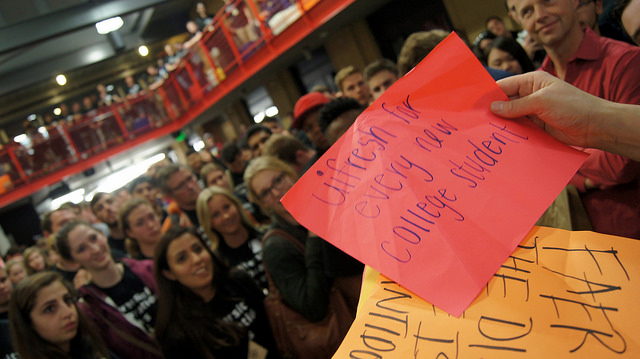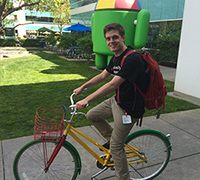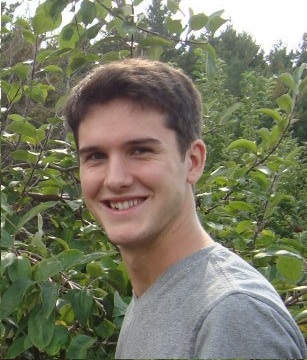29 Schools Collaborate on National Initiative to Attract and Retain New STEM Students
29 higher education institutions are taking part in the University Innovation Fellows program’s national STEM initiative.

April 13, 2016 — Today, the University Innovation Fellows announced that 29 higher education institutions are taking part in the national STEM initiative called #uifresh (University Innovation Freshmen). Schools participating in the initiative commit to exposing all incoming freshmen to design thinking, entrepreneurship and innovation in order to attract and retain more students in STEM disciplines.
This news was announced on April 13, 2016, to coincide with the White House Science Fair as part of a collection of initiatives to expand high-quality STEM education opportunities (read the White House fact sheet).
The #uifresh initiative was created by the University Innovation Fellows, a student leadership organization, to combat STEM attrition in the United States. According to a report published by the President’s Council of Advisors on Science and Technology, about 60 percent of students who arrive at college intending to major in STEM subjects switch to other subjects, often in their first year. #uifresh was launched with 10 institutions during the 5th White House Science Fair in March 2015 (read the launch announcement at bit.ly/uifresh-spring-2015). Since then, 19 additional institutions joined the initiative, including 9 new schools in the last three weeks.
The University Innovation Fellows program is run by the National Center for Engineering Pathways to Innovation (Epicenter), which is funded by the National Science Foundation and directed by Stanford University and VentureWell. The program empowers students to become change agents in higher education who help their peers develop an entrepreneurial mindset and creative confidence. The program has trained more than 600 students at 143 institutions since its inception.
The Fellows are working with their institutions’ leaders and orientation week organizers to provide learning opportunities that are fun, experiential, creative and lead to increased interest in innovation on campus. Fellows were required to secure letters of support from their college and university presidents in order to join the campaign.
Nine new institutions joined the initiative in 2016 (view the schools’ commitment letters in the links below):
- Bethune-Cookman University
- Colorado School of Mines
- Grand Valley State University
- Indiana University–Purdue University Indianapolis
- Kettering University
- Lawrence Technological University
- Saint Louis University
- University of Wisconsin–Milwaukee
- University of the Virgin Islands
The following institutions joined #uifresh in 2015:
- Clark Atlanta University
- Clemson University
- Florida Institute of Technology
- Howard University
- James Madison University
- Michigan Technological University
- New Mexico State University
- New York University Tandon School of Engineering
- North Dakota State University
- Temple University
- Texas A&M University
- Union College
- Universidad del Turabo
- University of Delaware
- University of Florida
- University of Minnesota
- University of Oklahoma
- University of Pittsburgh
- University of Virginia
- William Jewell College
In Fall 2015, #uifresh schools organized a variety of specially designed freshmen orientation activities. These activities ranged from a design thinking workshop with 1,300 freshmen from all majors to an event for first-year engineering majors focused on awareness, communication and teamwork. Read more about the Fall 2015 activities at bit.ly/uifresh-fall-2015.
To learn more about the University Innovation Fellows and their activities, visit universityinnovationfellows.org. The program is currently accepting applications for Fall 2016; apply by May 2 at universityinnovationfellows.org/apply.
About Epicenter:
The National Center for Engineering Pathways to Innovation (Epicenter) is funded by the National Science Foundation and directed by Stanford University and VentureWell (formerly NCIIA). Epicenter’s mission is to empower U.S. undergraduate engineering students to bring their ideas to life for the benefit of our economy and society. To do this, Epicenter helps students combine their technical skills, their ability to develop innovative technologies that solve important problems, and an entrepreneurial mindset and skillset. Epicenter’s three core initiatives are the University Innovation Fellows program for undergraduate engineering students and their peers; the Pathways to Innovation Program for institutional teams of faculty and university leaders; and a research program that informs activities and contributes to national knowledge on entrepreneurship and engineering education. Learn more and get involved at epicenter.stanford.edu.
About Stanford University:
At Stanford University, the Epicenter collaboration is managed by the Stanford Technology Ventures Program (STVP), the entrepreneurship center in Stanford’s School of Engineering. STVP delivers courses and extracurricular programs to Stanford students, creates scholarly research on high-impact technology ventures, and produces a large and growing collection of online content and experiences for people around the world. Visit us online at stvp.stanford.edu.
About VentureWell:
VentureWell was founded in 1995 as the National Collegiate Inventors and Innovators Alliance (NCIIA) and rebranded in 2014 to underscore its impact as an education network that cultivates revolutionary ideas and promising inventions. A not-for-profit organization reaching more than 200 universities, VentureWell is the leader in funding, training, coaching and early investment that brings student innovations to market. Inventions created by VentureWell grantees are reaching millions of people in more than 50 countries and helping to solve some of our greatest 21st century challenges. Visit www.venturewell.org to learn how we inspire students, faculty and investors to transform game-changing ideas into solutions for people and the planet.
Media contact:
Laurie Moore
Communications Manager, Epicenter
(650) 561-6113
laurie@universityinnovation.org




